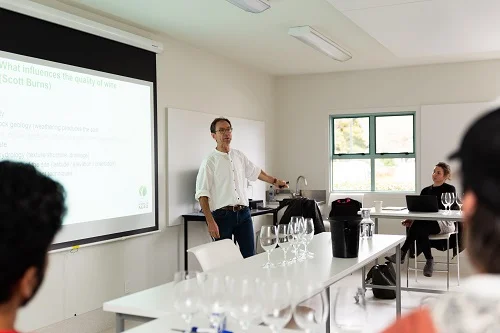After almost 20 years at the Marlborough Research Centre, new viticulture challenges are calling Marc Greven to France.
Since receiving a PhD degree in 2000 from Lincoln University, Marc has been working as a Research Scientist in Viticulture and Oenology for Plant & Food Research (PFR) while also teaching for Lincoln University and the Nelson Marlborough institute of Technology in Blenheim.
When Marc Greven was first invited to head to the prestigious Bordeaux Sciences Agro (BSA) he almost dismissed it.
“I would have to change my life drastically, so I needed to know how serious BSA was about working with me,” Marc says. But after further consideration and discussions, excitement took over.
So he took a one-year sabbatical in September 2018 and started as associate professor at BSA, a French ‘Grand École’ for agricultural engineering. In the French educational system this is a specialised “University” skimming off the crème de la crème of students after their 2nd year at University.
Besides teaching, most lecturers at BSA undertake research at the Institute of Science Viticulture, ISVV. ISVV is a grape and wine research organisation formed through collaboration between BSA, Bordeaux University and the French Research Institute INRA.
After working this one year in Bordeaux, Marc has now made the call to switch allegiances permanently and move to France. However, already collaborative research with Marlborough Research Centre colleagues is being planned.
MRC highlights
Marc says a definite highlight was when the (then HortResearch) team moved from MRC’s Grovetown Campus into the new purpose-built Marlborough Research Centre in Budge Street in 2004.
At the time the research focused on olives, apples, cherries and some grapes, with only five in the team: Rob Agnew, Dion Mundy, Sue Neal, Cherryl Fitzgerald and Marc. The Marlborough olive industry was then the biggest in the country and the apple industry was still important.
It was an exciting time. “We started off as a small group, but soon we were joined by three research staff from MRC - Mike Trought, Jeff Bennett and Kerry Strong - and due to additional grape research funding we had five postgraduate Lincoln University students working with us,” Marc recalls.
“In 2007 we had Carmo Vasconcelos, a tenured associate professor from Oregon University, boosting the research team”, Marc says. Together Marc and Carmo wrote a research paper about vine flowering that has since been quoted more than a notable 100 times in international research papers.
Over the next few years olives, cherries, and apples were pulled out and replaced with vines. Marc was mainly dedicated to vine water use and canopy research. In that context he worked together with Mike Trought and Sue Neal on the very influential mechanical thinning research work. “This work demonstrates that when you have the industry behind you, research gets picked up very quickly,” Marc says. In the third year of this 10ha research trial, there was enormous over cropping, and “overnight” the industry adopted the research, applying it to 4000ha of canopy area in Marlborough alone.
Marc says his best work investigated the influence of node numbers laid down at pruning, on vine development and yield. Two international papers were published from this work. Shortly after, in 2016, for research on immediate post-harvest canopy loss, Marc was the first New Zealander to receive the coveted prize for best viticulture paper from the American Society of Enology and Viticulture.
During his career he was also invited onto several scientific committees, but his personal highlight was the email which asked Marc to join one of the top teams in the world in viticulture, in France.
Now working at BSA, he describes the work as varied. In the past eight months with the French team, he has collaborated with people in Spain, Hungary, and Greece.
Marc’s main job is the organization of, and teaching in the newly developed Bachelor degree at BSA. However, he is also teaching in both the French and English language Master degree courses. Another exciting development he has been working on is the development of a new Wine Business course for corporate “suits” entering the wine world; the first will be held in Bordeaux this November. After that, Marc says it will probably be offered in Paris, New York, and Shanghai. Will Auckland be on the cards too?
We wish Marc bon voyage.

